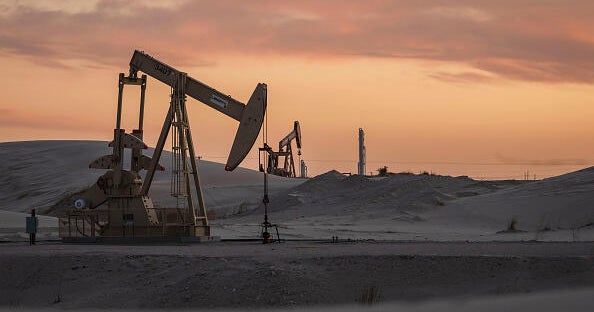The Trump administration said it will accelerate permit approvals for mining, drilling and fossil fuel production and transportation on public land, fast-tracking a review process that would normally take years.
In announcing the emergency procedures Wednesday, the Department of the Interior, which oversees the management of federal lands and natural resources, said the permitting process will now take up to “28 days at most” — a drastic departure from the current one- to two-year timeline.
The government agency said the move is in response to President Trump’s January 20 declaration of a national energy emergency. In an executive order on the first day of his second term, the White House said it would “eliminate harmful, coercive ‘climate’ policies that increase the costs of food and fuel.”
The speedy permitting policy opens the door for the U.S. to expand oil and gas projects and for Mr. Trump to make good on his promise to “Drill, baby, drill” — a common refrain on his campaign trail. The new guidelines will apply to a wide range of energy projects, including crude oil, natural gas and coal.
The U.S. leads the world in oil and gas production, with an output of 20 million barrels of oil a day and accounting for roughly a quarter of global gas production, according to the International Energy Agency.
The DOI said it would use emergency authorities under the National Environmental Policy Act, Endangered Species Act and the National Historic Preservation Act to expedite the permitting process.
“The United States cannot afford to wait,” Secretary of the Interior Doug Burgum said in a statement on Wednesday. “President Trump has made it clear that our energy security is national security, and these emergency procedures reflect our unwavering commitment to protecting both.”
Lawsuits to come, experts say
Environmental advocates rebuked the announcement, saying that in addition to adverse environmental impacts on public land and water sources, the expedited procedures will strip away community members’ ability to weigh in on projects happening in their own backyards. Experts say the move is expected to draw legal challenges.
“What they’re proposing to do is basically forgo environmental review or public participation or anything meaningful,” said Michael Burger, executive director of the Sabin Center for Climate Change Law at Columbia University. “The implications of that are extreme.”
The environmental review process has developed over time, he said, and goes back decades. The Endangered Species Act, one of three statues the DOI is targeting, was signed into law by President Richard Nixon in 1973. Section 7 of the Act requires consultation among agencies “to ensure their activities are not likely to jeopardize the continued existence” of federally protected species, according to the U.S. Fish & Wildlife Service.
A win for oil and gas industries
The announcement on Wednesday was a win for the American Petroleum Institute, the oil and gas industry’s largest lobbying group, which has cheered Mr. Trump’s energy agenda.
“Our nation’s permitting system is broken, and reform is essential to ensuring access to affordable, reliable energy,” Holly Hopkins, VP of upstream policy at the American Petroleum Institute, said in an email to CBS MoneyWatch.
Former officials from several different federal agencies who served under Mr. Trump’s previous term and the Biden administration have told CBS News on background that looming workforce reductions could throw a wrench in the department’s plans to speed up the permitting process. Also, breaking with long-standing practices could lead to major slipups, such as oil spills, they added.
The Department of the Interior employs about 70,000 staff members, according to its website. But cuts could be on the horizon. An internal White House document obtained by The Washington Post indicated that as many as 1 in 4 department employees could be let go as a part of a broader series of staff cuts across government agencies.
“How can you accomplish so much with fewer and fewer people?” said Burger of Columbia’s Sabin Center. “The only result is less and less oversight.”
Athan Manuel, director of the Lands Protection Program at the Sierra Club, agreed, adding that gutting the federal agency could hinder the Trump administration’s objectives.
“They just don’t seem to understand that these employees run the gamut from wildlife biologists to firefighters, to people who permit oil and gas drilling or permit mines on federal lands,” he said. “If it’s going to wholesale cut staff, some of the things they care about are going to get caught up in that.”
The Department of Interior did not respond to request for comment on how layoffs might impact its ability to issue permits on a tighter timetable.
According to the new procedural guidelines issued by the agency this week, companies seeking a permit are required to confirm in writing that they want their project covered by the expedited process — meaning that not everyone will necessarily opt in. Those that do could stand to lose big, Manuel said.
“Companies are very cautious before they sink millions of dollars into a well or to a mining project,” he said. “So I think they benefit from going slowly because they don’t want to be stuck with a stranded asset or literally drill a dry hole here.”


